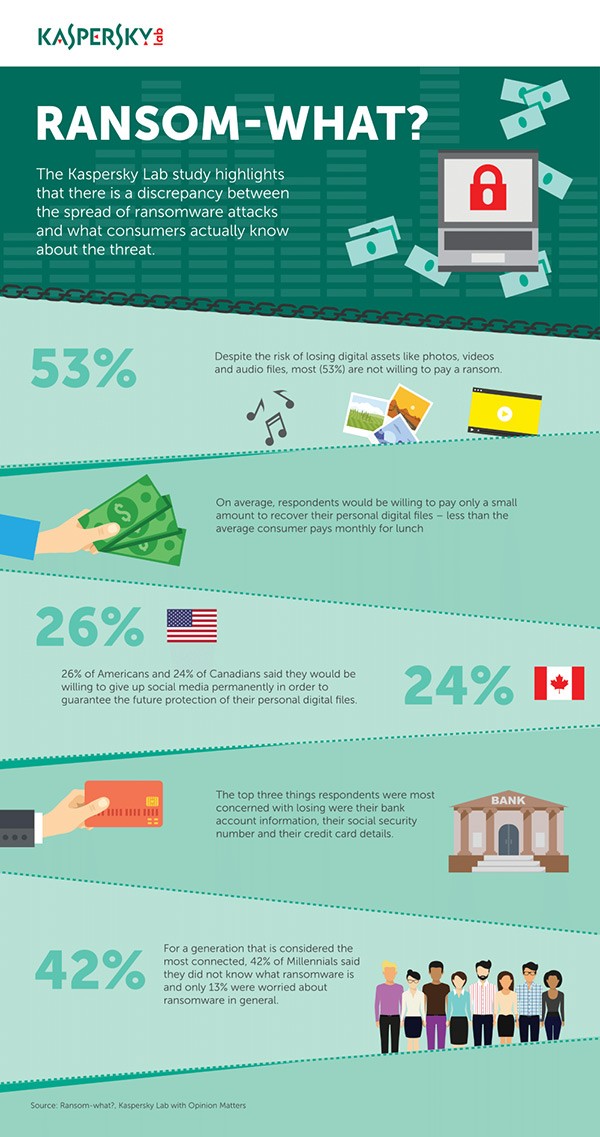Study Reveals Most Computer Users Don't Know What Ransomware is or What it Does
 Ransomware has undoubtedly put the computer security world on its heels with threats that cause utter destruction. As Ransomware evolves into much more aggressive types that encrypt data to make infected systems useless, computer users continue to be baffled as to know what ransomware is or how it operates.
Ransomware has undoubtedly put the computer security world on its heels with threats that cause utter destruction. As Ransomware evolves into much more aggressive types that encrypt data to make infected systems useless, computer users continue to be baffled as to know what ransomware is or how it operates.
In a recent study by security vendor Kaspersky, it was revealed that nearly half of computer users do not understand Ransomware or what it does. The study, summarized in the elaborate infographic below, points out several aspects of Ransomware and the percentage of populations that may not pay Ransom fees, do not know what ransomware is, or how many people from certain areas that would be willing to give up social media to protect their personal information.
Outlined in Kaspersky's recent study on ransomware, there appears to be a precedence of people who are more worried about other types of threats apart from Ransomware. In that, more computer users are more worried about trojans, viruses, and spyware than they are about ransomware. Moreover, about 43% of 5,000 computer users surveyed in Kaspersky's study did not know what ransomware was, while an additional 9% of them thought that ransomware was an act of hacking their social media account for ransom.
There appears to be a massive amount of computer users that do not know the first steps or an approach to fixing malware issues, let alone, fixing ransomware infection problems. A quarter of the surveyed participants in Kaspersky's recent study revealed that their preferred method for dealing with a ransomware infection is to disconnect the computer from the Internet. Obviously, such a method does not work and plays to the same tone of coming to the realization that most computer users do not know what ransomware is and the ramifications of the computer infection.
When it comes to ransomware, recent threats usually infect computers through spam email attachments. When installed after accessing a spam attachment ZIP file, ransomware in their current form will encrypt files and leave an infected system nearly useless for performing essential functions, in addition to surfing the web in some instances. Ransomware will then offer a method for obtaining a decryption key to decrypt and restore the encrypted files but for a substantial fee that is often paid in Bitcoin. In some rare occurrences, ransomware has taken computer users for thousands of dollars and even tens of thousands like in the case of a Hollywood Hospital paying $17,000 to ransomware authors to decrypt data on their systems.
As far as paying the ransom fee, Kaspersky found that 53% of their study participants were not willing to pay a ransomware fee even though they face the possibility of permanently losing all of their files.
Asking participants in Kaspersky's study what information that they would hate to lose most in a ransomware attack, the top three answers were social security numbers, credit card information, and bank account information. Ironically, ransomware doesn't steal such information, which plays along with the notion to verify Kaspersky's conclusion of most computer users not being aware of what ransomware is or what exactly it does.
Cybercrooks and hackers are more than likely well aware of what Kaspersky has vilified in their recent study on the awareness of ransomware. As a result, hackers are ramping up their efforts to spread ransomware and add sophisticated ransomware to the mix of their schemes.
Random Kaspersky Ransomware knowledge study results infographic - Source: Kaspersky

Leave a Reply
Please note that we are not able to assist with billing and support issues regarding SpyHunter or other products. If you're having issues with SpyHunter, please get in touch with SpyHunter customer support through your SpyHunter . If you have SpyHunter billing questions, we recommend you check the Billing FAQ. For general suggestions or feedback, contact us.